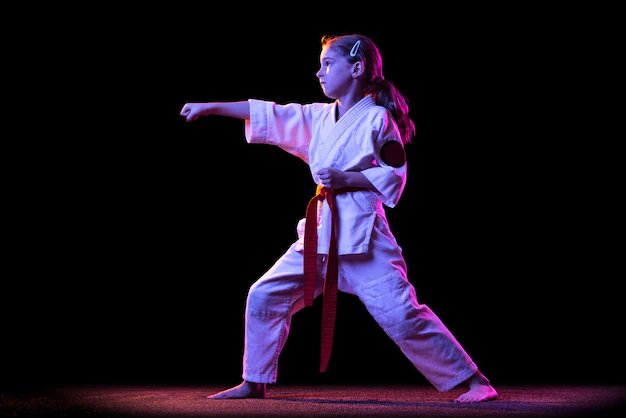Unlocking Your Child’s Potential: How Martial Arts Boost Confidence and Overcome Self-Doubt
Martial arts have been practiced for centuries and have become an increasingly popular activity for children in recent years. Many parents enroll their children in martial arts classes to help them develop discipline, self-defense skills, and physical fitness. However, one of the most significant benefits of martial arts training is the boost it provides to children’s confidence levels. In this article, we will explore how martial arts help children develop confidence.
How Can Martial Arts Build Children’s Confidence?
Martial arts are not just about kicking, punching, or learning self-defense techniques. It is also an art of developing mental and physical discipline, which can have a significant impact on children’s confidence levels. Children who participate in martial arts gain more than just physical strength; they develop a strong sense of self-confidence, self-esteem, and self-respect. Let us examine how martial arts can help children develop confidence.
Learning to Set and Achieve Goals
Martial arts training involves setting and achieving goals, which is essential for building confidence. Instructors often break down complex techniques into smaller, achievable steps, helping children to develop a sense of accomplishment and pride as they progress. This process helps children to realize that they can accomplish anything with hard work and dedication.
Positive Reinforcement
In martial arts, positive reinforcement is crucial to the learning process. Instructors often praise children for their efforts, which helps to build confidence and self-esteem. This positive feedback reinforces the child’s belief in their abilities and encourages them to continue to work hard.
Overcoming Challenges
Martial arts training is challenging, and children are encouraged to push themselves beyond their limits. By overcoming these challenges, children develop resilience, which is essential for building confidence. When children face adversity and come out on top, they learn that they are capable of achieving great things.
Developing Respect for Self and Others
Respect is a fundamental value in martial arts. Children are taught to respect themselves, their peers, and their instructors. By developing respect for themselves, children learn to value their opinions, ideas, and feelings, which helps to build self-confidence. Additionally, by showing respect to others, children build strong relationships, which can also contribute to their overall confidence levels.
Improving Physical Fitness
Martial arts training involves physical activity, which can help children to develop a healthy body image and increase their overall confidence levels. Children who participate in martial arts are more likely to feel good about their bodies and feel more confident in their physical abilities.
Learning Self-Defense Techniques
One of the main benefits of martial arts training is learning self-defense techniques. Children who are confident in their ability to defend themselves are less likely to be victims of bullying or other forms of physical violence. This increased sense of safety can contribute to a child’s overall confidence levels.
Building Social Skills
Martial arts classes provide an opportunity for children to interact with peers and develop social skills. Children who are confident in social situations are more likely to participate in group activities and make friends. This increased socialization can contribute to a child’s overall confidence levels.
Developing a Growth Mindset
Martial arts training encourages children to develop a growth mindset. Instead of focusing on their limitations, children are taught to focus on their strengths and to believe that they can improve with practice and effort. This mindset helps children to develop a strong sense of self-confidence and a belief in their abilities.
Encouraging Perseverance
Perseverance is a crucial skill for building confidence. In martial arts training, children are encouraged to persevere through difficult challenges, such as learning a complex technique or overcoming a physical limitation. By persevering through these challenges, children develop a strong sense of self-confidence and belief in their abilities.
Helps Kids Become More Athletic
Yes, martial arts can help kids become more athletic. Martial arts training involves a variety of physical activities that can improve a child’s fitness, strength, flexibility, coordination, and balance.
For example, most martial arts include a combination of techniques such as punching, kicking, blocking, and grappling, which require the use of various muscle groups and enhance overall body coordination. Additionally, martial arts training often includes cardiovascular exercises, such as jumping jacks and running, which can improve endurance and stamina.
Martial arts can also help children develop discipline and focus, which can transfer to other sports and physical activities. Furthermore, practicing martial arts can improve a child’s self-confidence and self-esteem, which can motivate them to participate in other athletic activities.
It Teaches Them That Size and Gender Don’t Matter
In martial arts classes, students learn how to use their bodies effectively, regardless of their size or gender. They learn techniques that allow them to use their opponent’s strength against them, as well as techniques that enable them to defend themselves against larger and stronger opponents. This means that smaller and weaker individuals can still be effective in a self-defense situation, simply by using their training to their advantage.
Moreover, martial arts classes often emphasize the importance of respect and discipline, which helps children develop self-confidence and self-esteem. When children learn that they are capable of defending themselves, regardless of their size or gender, they are more likely to feel confident and empowered in other aspects of their lives as well.
Martial Arts Teach Children to Deal With Failure
Martial arts can be an excellent way for kids to learn how to deal with failure. One of the primary tenets of many martial arts disciplines is the idea of continuous improvement through practice and discipline. In martial arts, it’s common for students to fail many times before succeeding, whether it’s mastering a new technique or achieving a new belt level.
Through this process, children can learn to develop resilience and perseverance. They will understand that failure is a natural part of the learning process and that it is essential to keep trying and never give up. Martial arts training can also help children to develop a growth mindset, which is the belief that their abilities and skills can be improved through hard work and dedication.
By practicing martial arts, children can gain a sense of accomplishment and pride in their achievements, no matter how small. This sense of achievement can help them to feel better about themselves and their abilities, even in the face of failure.
Overall, the training and discipline provided by martial arts can help children develop a positive attitude towards failure, learn to accept and learn from their mistakes and develop resilience, perseverance, and self-confidence. These skills can benefit children in all aspects of their lives, both now and in the future.
What is the Ideal Age to Start Martial Arts?
The best age to start martial arts can vary depending on the individual child and the specific martial art being considered. Generally speaking, many martial arts schools offer classes for children as young as three or four years old, but the optimal age to start can depend on several factors, including the child’s physical, cognitive, and emotional development.
In general, children who are around six to eight years old are often considered a good age to start martial arts. At this age, children have typically developed the necessary physical, cognitive, and emotional skills to start learning martial arts in a structured setting. However, it’s important to remember that every child is different and may be ready to start at different ages.
Ultimately, the decision to start martial arts should be based on the individual child’s needs and readiness. It’s important to speak with instructors and evaluate your child’s readiness before making a decision.
Enroll Your Kids Now in Pinnacle Martial Arts Academy
As we have seen throughout this article, there are many ways in which martial arts can help children develop confidence. If you’re interested in enrolling your child in martial arts, consider Pinnacle Martial Arts Academy, a top-notch martial arts facility offering Kid’s Martial Arts, Teen’s Martial Arts, Brazilian Jiu Jitsu, Wrestling, Kickboxing, and Judo programs. With affiliations to Grappling Fight Team (GFTeam), Wall to Wall Martial Arts, Amateur Athletic Union (AAU) Judo, and Freestyle Judo Association, you can trust that your child will receive the highest quality instruction and training.
Don’t miss out on this incredible opportunity to give your child the gift of confidence and self-esteem through the practice of martial arts. Sign up today!

